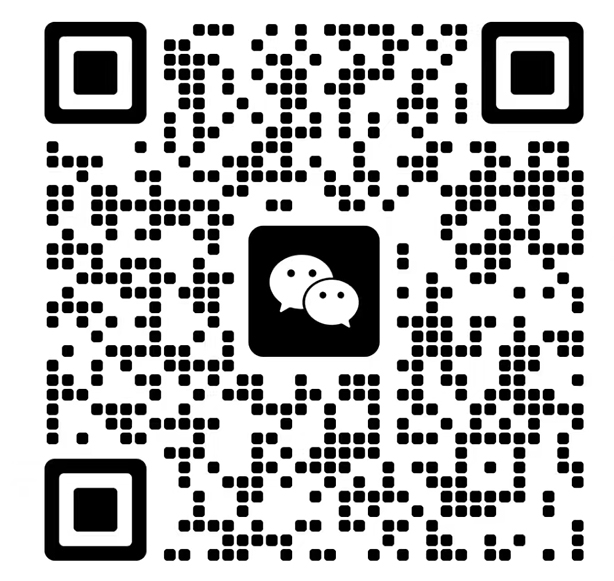Global News
British "Nature" magazine apologized to China for three consecutive days
British "Nature" magazine apologized.
As one of the world's top academic journals, the magazine previously directly linked the new cOrOnAvirus to Wuhan and China.
In the latest editorial, "Nature" magazine stated that "the original approach was indeed wrong, and we would like to take responsibility and apologize for this."
Apologies for three consecutive days: "The virus does not discriminate - all of us are at risk"
The apology of the British "Nature" magazine was first published on the official website on April 7 in English editorial.
On April 8, the same content was published on the overseas social accounts of Nature magazine.
On April 9, the official WeChat account of Nature magazine released a Chinese translation.
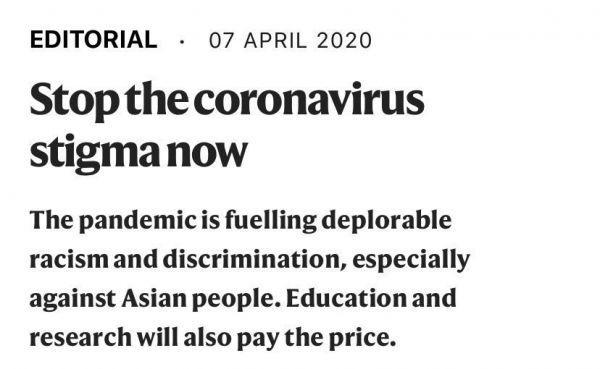
Nature EDITORIAL
07 APRIL 2020
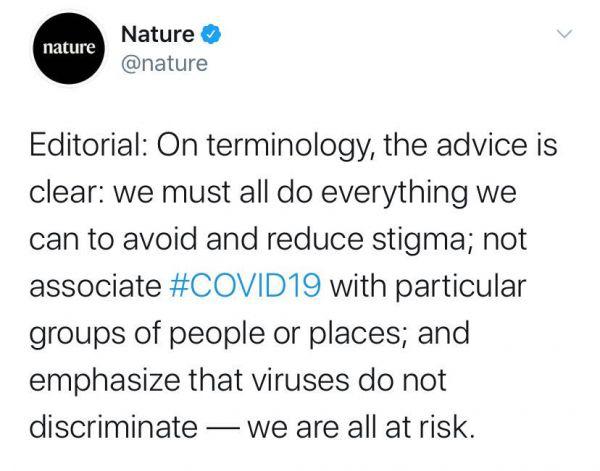
Nature EDITORIAL
Stop the coronavirus stigma now
The pandemic is fuelling deplorable racism and discrimination, especially against Asian people. Education and research will also pay the price.
When the World Health Organization (WHO) announced in February that the disease caused by the new coronavirus would be called COVID 19, the name was quickly adopted by organizations involved in communicating public-health information. As well as naming the illness, the WHO was implicitly sending a reminder to those who had erroneously been associating the virus with Wuhan and with China in their news coverage— including Nature. That we did so was an error on our part, for which we take responsibility and apologize.
For years, it was common for viral diseases to be associated with the landscapes, places or regions where the first outbreaks occurred — as in Middle East respiratory syndrome, or Zika virus, named after a forest in Uganda. But in 2015, the WHO introduced guidelines to stop this practice and thereby reduce stigma and negative impacts such as fear or anger directed towards those regions or their people. The guidelines underlined the point that viruses infect all humans: when an outbreak happens, everyone is at risk, regardless of who they are or where they are from.
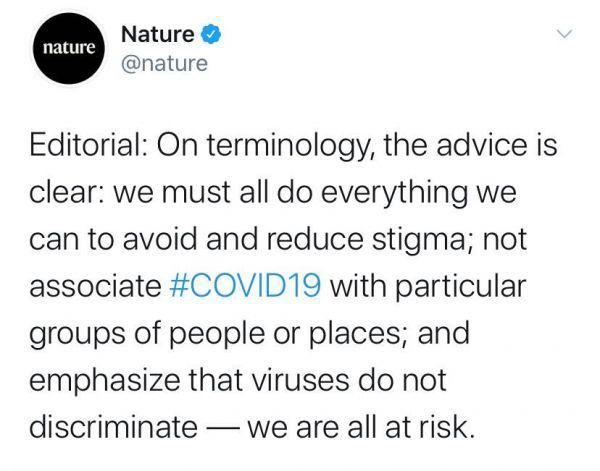
Screenshot of Nature Magazine Twitter
Screenshot of the WeChat Official Account of Nature Magazine
For three consecutive days, three times at home and abroad, this world-famous scientific journal expressed its attitude.
And among them "including "Nature" magazine.
"Our original approach was indeed wrong, and we would like to take responsibility and apologize for this." The article wrote.
After the apology, the editorial did not forget about popular science. The WHO issued guidelines as early as 2015, calling for the cessation of this practice in order to reduce stigma and bad influences, such as fear or anger towards the affected area or local people.
After clarifying the attitude, this apology editorial did not stop here, but further extended the two sub-topics of "racist attack" and "all damage", depicting the stigmatization of the new crown virus to specific groups and the world. Serious impact.
A better summary may be the sentence extracted by Nature magazine on its overseas account: Viruses do not discriminate-all of us are at risk.

San Francisco Chinatown during the COVID-19 pandemic (Photo by Nature Magazine)
Multinational Netizens chanted: Stop stigmatization!
This heavy scream to the world in the name of science immediately triggered heated discussions and resonance from all parties.
The US National Review website noted in a report on April 9 that Nature magazine also accused a few politicians of "holding the old rules" in the article and named many Western politicians who had previously smeared China.
"Insistently linking a virus and the disease it causes to a certain place is an irresponsible behavior that needs to be stopped immediately." The report quoted an article in the journal Nature as saying.
The Russian Satellite News Agency quoted another paragraph in the article saying that if the stigma caused by the new coronavirus causes Asian young people to leave international campuses, shorten the time of education, give up opportunities for themselves and others, and make the scientific research environment deteriorating - When the world relies on scientific research to find a way out, it will be a tragedy.
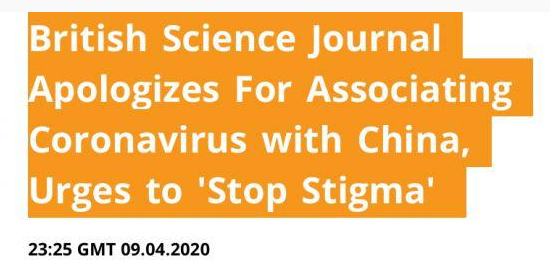
Screenshot of Russian Satellite News Agency report
The article in Nature magazine sparked discussion among Chinese and foreign netizens.
Many Chinese netizens first expressed appreciation for the actions of Nature magazine to correct mistakes and oppose stigma.
Some foreign netizens began to reflect on the previous public opinion attacks in the West.
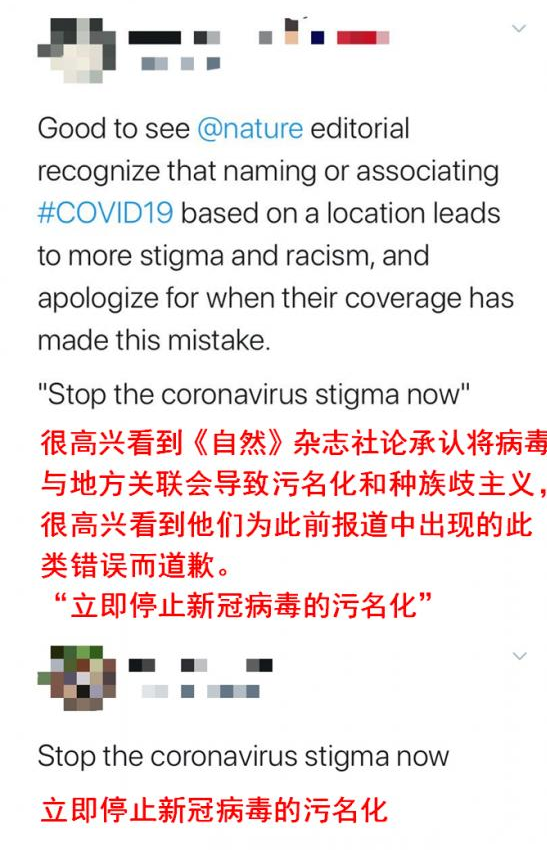
"Stigmatizing and accusing others will not drive away the virus"
In fact, as the epidemic spreads around the world, voices against stigma and discrimination are increasing.
The American Anti-Defamation League, the National Committee of Asian Americans, and 258 other groups previously wrote to the bipartisan leaders of the House of Representatives, urging Congress to take practical measures to curb racism, xenophobia and misinformation.
The Washington State Department of Health specially designed a link to the topic of "Reducing Stigma", emphasizing that misinformation about the epidemic can cause fear and hostility.
While opposing stigma has become a trend, more and more people are also seeing: the impact of stigma is not limited to China. Under the threat of the new coronavirus, everyone may be in danger. Under the threat of a "ideological virus" full of prejudice, discrimination, and racism, anyone can become the next victim.
At the regular press conference of the Ministry of Foreign Affairs on April 9, the spokesman Zhao Lijian also refuted that US politicians used the epidemic to discredit China again, saying that the stigmatization of China was unpopular.
Zhao Lijian pointed out that any country should always put people's right to life and health in the first place, and provide adequate and effective protection for its people. "Stigmatizing and accusing others will not drive away the virus," he said.

